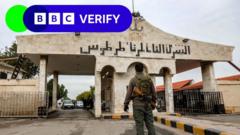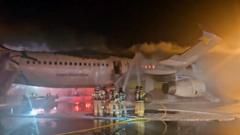The arrival of the Sparta and Sparta II at Tartous points to a potential reduction of Russian military influence in Syria, following the recent fall of the Assad regime. Analysts believe this may mark the beginning of Russia's withdrawal from the region as discussions about the lease for the port continue amidst increasing military logistics activities.
Russian Naval Withdrawal Signals Shift in Syria's Military Landscape

Russian Naval Withdrawal Signals Shift in Syria's Military Landscape
As two Russian ships dock at Tartous, experts suggest an imminent evacuation, raising questions about Moscow's future military presence in Syria.
Two Russian military ships, the Sparta and Sparta II, have docked at the Kremlin's naval base in Tartous, Syria, indicating that a significant withdrawal of Russian military presence may be commencing. The arrival of these vessels, both sanctioned by the US and linked to the transportation of Russian arms, has come amid growing scrutiny over Russia's future role in Syria following the fall of the Assad regime in December.
For weeks, large amounts of military hardware have been observed at the port through satellite imagery, suggesting preparations for an operational shift. As international tracking sites confirmed the ships' docking on Tuesday evening, they also noted that the downed vessels had remained off Syria's coast for an extended period, likely pending approval for entry during ongoing lease discussions with Syria's new transitional government.
Tartous has served as a strategic base for Russian military operations, allowing essential logistical support in the Mediterranean region. The potential cancellation of Russia's port lease, refused to be confirmed by Syrian sources or Kremlin officials, adds to the speculation surrounding Moscow's operational viability in Syria. Analysts suggest a strategic withdrawal appears imminent, as the government in Damascus has shown reluctance to continue the lengthy military alliance with Russia.
Further complicating the situation, additional ships may be present in the port to assist in the ongoing evacuation, indicating that a larger logistical operation could be underway. With the regional dynamics shifting, many are analyzing the implications of Russia's military exodus on the balance of power in Syria and the surrounding region.
Additionally, activity at Hmeimim airbase continues to accelerate, with satellite images revealing that large Russian aircraft are increasingly loaded with military supplies, indicating potential redeployment to other operational bases, including airfields in Libya. This movement aligns with Russia's previous international commitments, reinforcing its support for certain factions in the Libyan conflict.
As the situation evolves, military experts underscore the necessity for closer monitoring of Russia's actions and how these developments may reshape the geopolitical landscape in both Syria and wider North Africa. The potential reallocation of military capabilities may soon impact Russia's ability to project power and maintain influence in the volatile Middle East region.





















